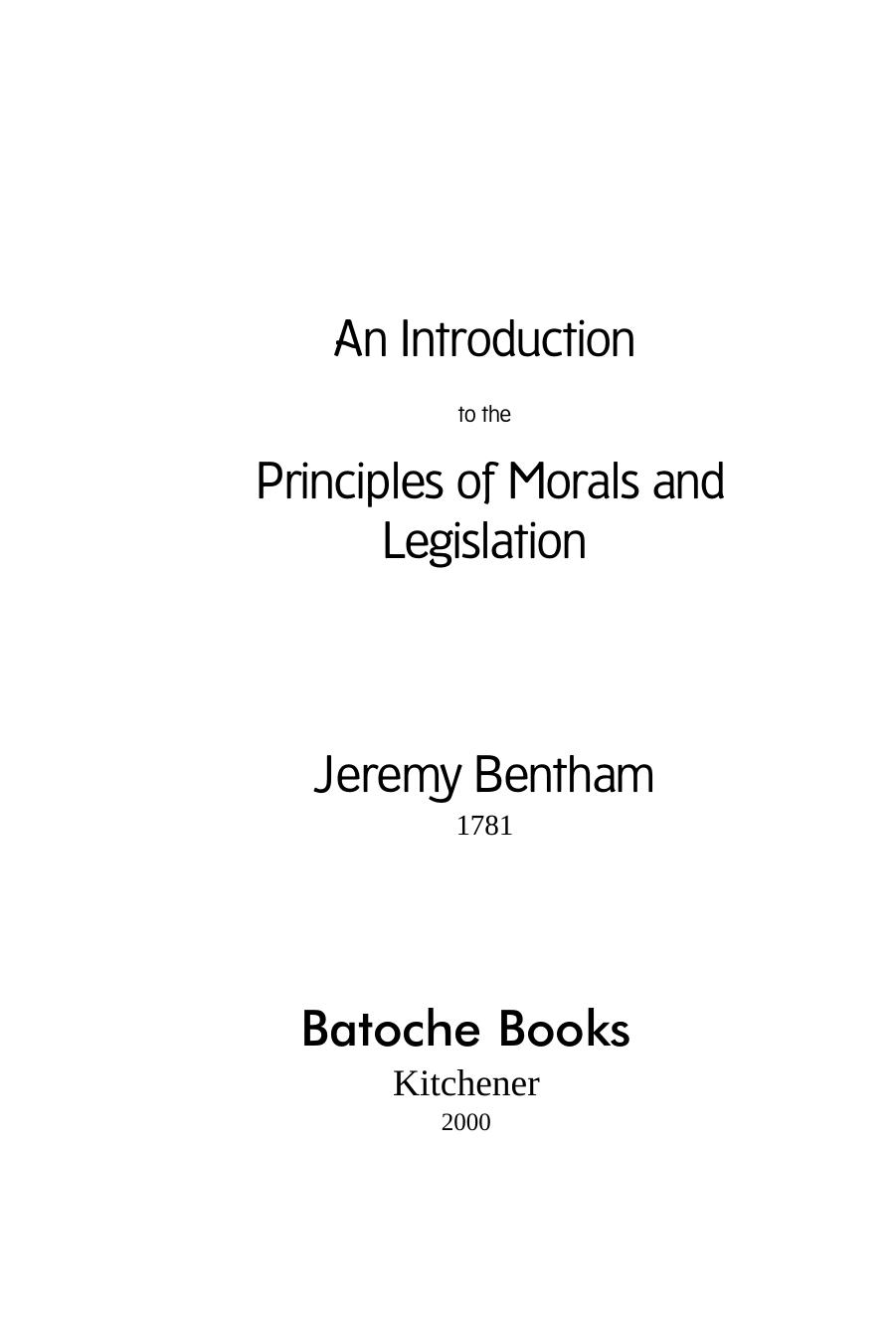An Introduction to the Principles of Morals and Legislation by Jeremy Bentham

Author:Jeremy Bentham
Language: eng
Format: mobi, pdf
Publisher: Liberty Fund, Inc.
Published: 2010-09-07T23:00:00+00:00
§ 2. How Intentionality, &c. may influence the mischief of an act.
XIX. We have seen the nature of the secondary mischief, which is apt to be reflected, as it were, from the primary, in the cases where the individuals who are the objects of the mischief are assignable. It is now time to examine into the circumstances upon which the production of such secondary mischief depends. These circumstances are no others than the four articles which have formed the subjects of the four last preceding chapters: viz. 1. The intentionality, 2. The consciousness. 3. The motive. 4. The disposition. It is to be observed all along, that it is only the danger that is immediately governed by the real state of the mind in respect to those articles: it is by the apparent state of it that the alarm is governed. It is governed by the real only in as far as the apparent happens, as in most cases it may be expected to do, to quadrate with the real. The different influences of the articles of intentionality and consciousness may be represented in the several cases following.
XX. Case 1. Where the act is so completely unintentional, as to be altogether involuntary. In this case it is attended with no secondary mischief at all.
A bricklayer is at work upon a house: a passenger is walking in the street below. A fellow-workman comes and gives the bricklayer a violent push, in consequence of which he falls upon the passenger, and hurts him. It is plain there is nothing in this event that can give other people, who may happen to be in the street, the least reason to apprehend any thing in future on the part of the man who fell, whatever there may be with regard to the man who pushed him.
XXI. Case 2. Where the act, though not unintentional, is unadvised, insomuch that the mischievous part of the consequences is unintentional, but the unadvisedness is attended with heedlessness. In this case the act is attended with some small degree of secondary mischief, in proportion to the degree of heedlessness.
A groom being on horseback, and riding through a frequented street, turns a corner at a full pace, and rides over a passenger, who happens to be going by. It is plain, by this behaviour of the groom, some degree of alarm may be produced, less or greater, according to the degree of heedlessness betrayed by him: according to the quickness of his pace, the fullness of the street, and so forth. He has done mischief, it may be said, by his carelessness, already: who knows but that on other occasions the like cause may produce the like effect?
XXII. Case 3. Where the act is misadvised with respect to a circumstance, which, had it existed, would fully have excluded or (what comes to the same thing) outweighed the primary mischief: and there is no rashness in the case. In this case the act is attended with no secondary mischief at all.
It is needless to multiply examples any farther.
Download
An Introduction to the Principles of Morals and Legislation by Jeremy Bentham.pdf
This site does not store any files on its server. We only index and link to content provided by other sites. Please contact the content providers to delete copyright contents if any and email us, we'll remove relevant links or contents immediately.
| Anthropology | Archaeology |
| Philosophy | Politics & Government |
| Social Sciences | Sociology |
| Women's Studies |
The remains of the day by Kazuo Ishiguro(7551)
Tools of Titans by Timothy Ferriss(6945)
The Black Swan by Nassim Nicholas Taleb(6190)
Inner Engineering: A Yogi's Guide to Joy by Sadhguru(5894)
Giovanni's Room by James Baldwin(5877)
The Way of Zen by Alan W. Watts(5798)
The Six Wives Of Henry VIII (WOMEN IN HISTORY) by Fraser Antonia(4790)
The Power of Now: A Guide to Spiritual Enlightenment by Eckhart Tolle(4753)
Astrophysics for People in a Hurry by Neil DeGrasse Tyson(4619)
Asking the Right Questions: A Guide to Critical Thinking by M. Neil Browne & Stuart M. Keeley(4574)
12 Rules for Life by Jordan B. Peterson(3733)
The Ethical Slut by Janet W. Hardy(3502)
Skin in the Game by Nassim Nicholas Taleb(3459)
Housekeeping by Marilynne Robinson(3401)
The Art of Happiness by The Dalai Lama(3382)
Double Down (Diary of a Wimpy Kid Book 11) by Jeff Kinney(3272)
Skin in the Game: Hidden Asymmetries in Daily Life by Nassim Nicholas Taleb(3264)
Walking by Henry David Thoreau(3234)
12 Rules for Life: An Antidote to Chaos by Jordan B. Peterson(3200)
